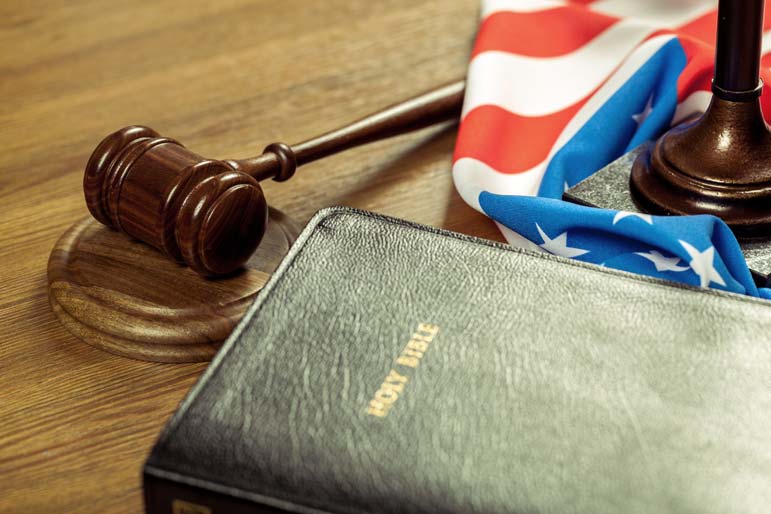
Many readers are aware of the Masterpiece Cakeshop case involving a Christian baker who was punished by the state of Colorado for refusing on religious grounds to bake and design a wedding cake for a same-gender coupling celebration. The litigation, which the "ultra-Orthodox" umbrella group, Agudath Israel of America, calls “one of the… most closely watched religious liberty cases in recent years,” is now before the Supreme Court, and last week, the Agudah filed an amicus brief written by Washington attorney (and my in-law) Jeff Zuckerman.
I wasn’t privy to the strategy meetings on the matter, but it seems to me that the brief accomplishes something very important.
In straightforward legal terms, it seems difficult to see how the Court could come down on the side of Colorado. The baker is asserting his First Amendment right to the free exercise of his genuinely held religious belief that it would be sinful to abet this ceremony. End of story.
But that simple, logical rendition leaves out a major subplot of the story — the alternative lifestyle movement’s steamrolling of American society on behalf of, first, the normalization, and now, the celebration of its cause. It has won, and society — and sanity — has lost. End of story.
That may be why the “Question Presented” at the outset of the brief was framed this way: “Will our society honor the guarantees of the Free Exercise Clause when a religious practice is based upon a moral judgment that is anathema to the contemporary zeitgeist?”
This case is not about conflicting legal claims; it is about whether it is still possible in today’s America to assert an uncontested constitutional right in the face of the righteous fury of the greatest single expression of the “contemporary zeitgeist.” And thus it is the zeitgeist, the morally anarchic spirit of the times in which we live, that must be shown to be a farce.
The brief sets out to so subtly undermine the legitimacy of that zeitgeist by noting the bottomless arrogance of believing that a brand-new moral insight into the character of marriage has transformed that which all of humanity believed throughout history into rank bigotry:
Not long ago, this case would have been inconceivable, even as a law school exam hypothetical. Until very recently, the moral values of America were generally consistent with the moral values reflected in Jewish law. This is no longer true…. American society has also changed radically, in a very short period of time, its moral judgment concerning [same-gender] activities….
Nothing in the Constitution changed between the Bowers decision in 1986 [criminalizing immoral relationships] and the Obergefell decision in 2015 [holding that there is a constitutional right to same-gender marriage]. The contemporary zeitgeist, however, had made a 180-degree about-face. Among the intellectual and philosophical opinion-shapers of America, a consensus formed that [same-gender] “marriage” is just a marriage.
While U.S. constitutional law may have this flexibility, Jewish law, based upon the divinely revealed Written Law and Oral Law, is immutable. Thus, under Jewish law, [same-gender] activities remain an abomination, and a marriage of two men remains inconceivable.
We recognize that our values in this area are out of sync with those of 2017 America. We believe that America has made a grievous mistake, but that is beside the point now. All we seek here, and all that we say the Free Exercise Clause requires, is to be allowed to continue to live our lives in accordance with Jewish law.
In this, the brief follows the lead of the late Justice Antonin Scalia, who wrote this in his dissent in Obergefell, the case that legalized same-gender couplings:
But what really astounds is the hubris reflected in today’s judicial Putsch…. They have discovered in the Fourteenth Amendment a “fundamental right” overlooked by every person alive at the time of ratification, and almost everyone else in the time since…. These Justices know that limiting marriage to one man and one woman is contrary to reason; they know that an institution as old as government itself, and accepted by every nation in history until 15 years ago, cannot possibly be supported by anything other than ignorance or bigotry. And they are willing to say that any citizen who does not agree with that, who adheres to what was, until 15 years ago, the unanimous judgment of all generations and all societies, stands against the Constitution.
Both Scalia’s dissent and the Agudah brief are engaged in a subtle form of leitznusa d’avodah zarah. Each holds up for ridicule a newly hallowed societal belief that gives a veneer of legitimacy and moral seriousness to what is nothing more than licentiousness, turning the normal into the immoral and vice versa.
But while Justice Scalia spoke against the enshrinement of this belief into law, striving to hold back the pan-societal tide, the Agudah’s submission to the Court isn’t trying to convince anyone of the folly of their ways. Its claim is simple: Whatever nonsense society may now have chosen to believe, leave us alone.
Comment by clicking here.
Eytan Kobre is an attorney practicing in Brooklyn, New York. He studied at the Yeshiva of Staten Island and Yeshiva Shaar HaTorah. A graduate of the Fordham University School of Law, he previously practiced law with two Manhattan firms and served for several years as associate general counsel at Agudath Israel of America. He is an editor at Mishpacha magazine, where this first appeared.


 Contact The Editor
Contact The Editor
 Articles By This Author
Articles By This Author